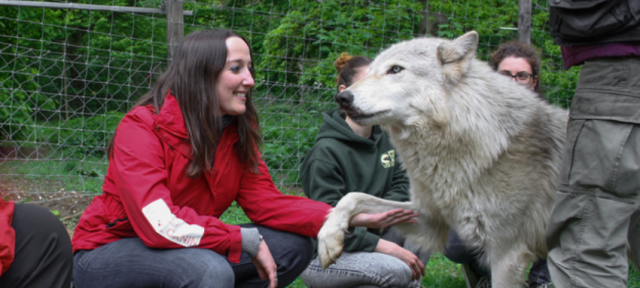Introducing Professor of Animal Behavior Lauren Robinson

Hampshire College is pleased to welcome a substantial cohort of new professors to campus this fall to support its growing enrollment and incoming fall class.
Among them is Visiting Assistant Professor of Animal Behavior Lauren Robinson, who comes to us from the University of Michigan, where most recently she was a postdoctoral researcher studying cooperation in humans and bonobos. Robinson’s studies have been conducted at zoos, research facilities, and sanctuaries, and she has worked with more than a dozen species, including half a dozen nonhuman primates, wolves and dogs, and even the occasional Nubian goat.
At Hampshire, her courses will focus on animal behavior and nonhuman primate welfare. She hopes to partner with the Environments and Change Learning Collaborative to delve deeper into her research as it relates to climate change.
What are you passionate about when it comes to your work?
Animals are individuals — anyone who has spent time with them knows this. I’m passionate about understanding them as individuals and finding ways to improve their well-being, known as their welfare. It’s my belief that by looking at individual differences in how animals feel, think, and act (that is, their welfare, cognition, and personality), we can individualize their care and provide them with better lives. What’s not to be passionate about in that?
Tell us about some of the research you’ve conducted.
I’ve found multiple relationships between personality and welfare in nonhuman primates, looked at their aversion to unequal pay (or in this case how much they love Cheerios), and studied the bonds between humans and dogs and wolves, among other studies.
My findings have been published in Frontiers in Psychology, American Journal of Primatology, Applied Animal Behaviour Science, and elsewhere. I’m also the coeditor of Nonhuman Primate Welfare: From History, Science, and Ethics to Practice, a practical guide for welfare assessment, housing, enrichment, and training of primates.
Have you held any other jobs that had an impact on how you teach and learn?
I spent seven years working in retail to support myself in undergraduate school and between degrees. During that time, I learned to speak to anyone and to make complicated topics approachable and easy to understand. It's given me confidence with public speaking and influenced how I teach through experience, adapting what I say to the audience I’m working with.
What are you looking forward to at Hampshire?
I’m eager to start my first term doing assistant professor work. As I leave postdoc-ing behind, this is a great step forward with an exciting college and group of colleagues and students. Spending a year as a visiting assistant professor at Hampshire is going to be wonderful for gaining more teaching experience and broadening my views. And, as I’m from the West Coast, I can’t wait to see autumn in Massachusetts.
How do you hope to engage with our new curricular model?
We’re seeing the effects of climate change all around us as heat worldwide breaks records days on end. Of course, we’re not alone in being affected by climate change. I hope to work with the Environments and Change Learning Collaborative by expanding students’ perspectives to include thinking about the challenges animals face in these times. It won’t be easy to find solutions for both humans and nonhuman animals but we must be aware of the realities and respond with significant actions.



